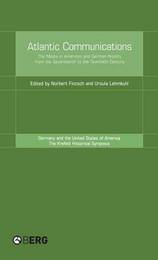
|
Atlantic Communications: The Media in American and German History from the Seventeenth to the Twentieth Century
Hardback
Main Details
Description
Atlantic Communications examines the historical development of communications technology and its impact on German-American relations from the seventeenth to the twentieth century. Chronologically organized, the book is divided into five parts, each scrutinizing one or two central themes connected to the specific time period and technology involved. The book starts with "speech" as a dominant medium of the seventeenth and eighteenth centuries, when cultural brokers played a significant role in producing and spreading knowledge about "America". During the nineteenth century, the technological competition between the old and the new world became a driving force for the history of transatlantic relations. This competition developed new dimensions with the invention of the telegraph and the emergence of news agencies. Information became commercialized. At the turn of the century the mass production of print media became technologically possible. Print media, daily journals and especially weekly magazines became the medium of a critical style of journalism. The Muckrakers, representatives of a political and intellectual elite, criticized the social and cultural consequences of technological progress, thereby highlighting the negative effects of modernization. During the 1920s and 1930s, radio developed as a new mass medium, the first one to be used widely for political purposes. Not only did Josef Goebbels recognize the political possibilities of reaching the people directly via radio; Franklin Roosevelt used the radio as well to transmit his political messages in the form of "fireside chats". Eventually, in the late 1970s film and television were discovered as a means to communicate the past, especially the historical experience of the Holocaust. Specific cultures of memory developed in both America and Germany. The demand to tackle the psychological and social problems stemming from the experiences during the Third Reich, advocated especially by the student movement, was most successfully taken up by the media. The television miniseries "Holocaust" had a far more profound impact on the public than efforts taken by school teachers, history professors or the institutions for political education who were officially in charge of "Vergangenheitsbewaltigung".
Author Biography
Norbert Finzsch Professor of Anglo-American History and Chair of Department, University of Cologne. Ursula Lehmkuhl Professor of North American History, John F. Kennedy Institute, Free University of Berlin
Reviews'Let us hope that the message of Atlantic Communications - that the scholars from different backgrounds should be encouraged to communicate - does indeed shape the medium.' Jon Agar, Journal of Contemporary History Vol 40. No. 4
|